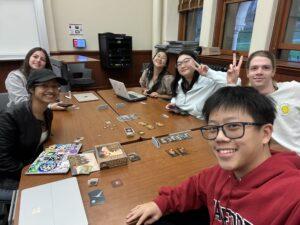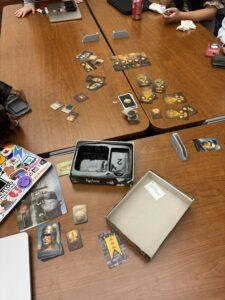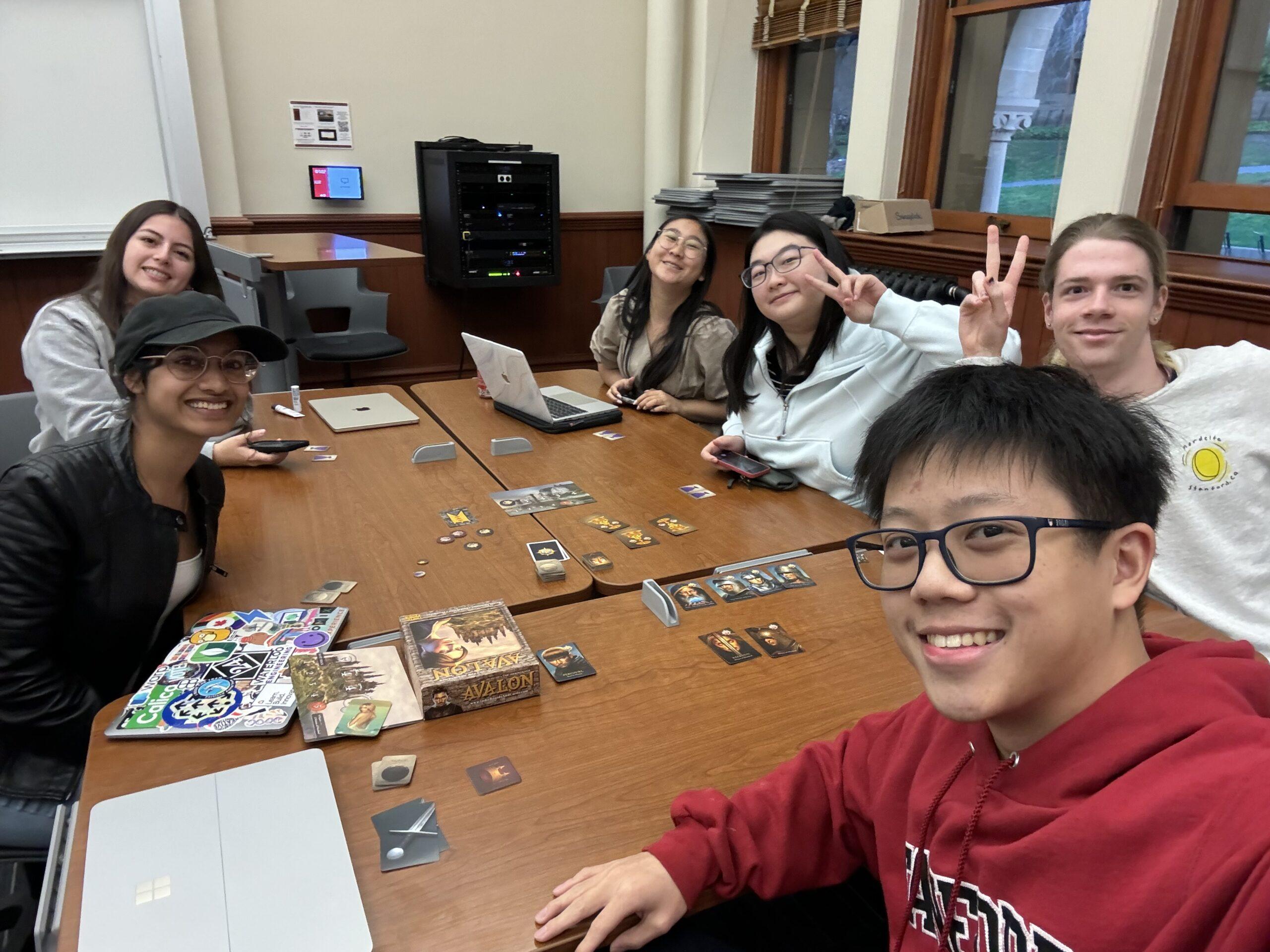(The critical play analysis happens at the beginning of the third paragraph; I introduce the game and my experience in the first two!)
Avalon is a medieval tale about King Arthur’s loyal knights fighting the evil forces of Mordred and their many minions. Merlin comes to the loyal knights’ aid, who can identify these evil minions apart from the evil Mordred herself. Designed by Don Eskridge, a master of social deduction board game development, the game is made for anybody who loves bluffing or calling out others for bluffing. (Despite the 13+ age range posted on the game’s cover, the game’s mechanics lend themselves to any audience confident enough to hold a lie.) Although my critical play primarily revolves around an in-person experience, anyone can also play the game online at https://avalon.fun/.
In my critical play, I played two games in a group of six (Merlin, three knights, Assassin, one minion) and one game in a group of seven (Merlin, Percival, two knights, Assassin, Mordred, one minion). One exciting thing about Avalon is its skill curve and the development of different strategies that emerge from the many phases and places that require player input. Initially, the game was relatively streamlined without any developed strategies, leading to two (quite easy) knight wins. The evil forces were never put into teams due to lucky assignments and the fact that nobody rejected team votes. The gameplay shifted to be slower, rejecting most teams to read how other people reacted to specific combinations of players. Suddenly, we were taking more time, and once we varied the roles to balance the teams (introducing Percival and Mordred), we accomplished a close evil win at the very end. The ability to remove and add complexity through the arrangement of roles is fun and kept the game interesting (in fact, I left wanting to play more with the other roles we hadn’t yet uncovered). This inclusion also made it very easy to play some smaller games to understand the game’s flow before ramping up to create more exciting dynamics. Because of this, a designer has the option to decide to introduce more roles (like an “extension” to Avalon) to keep the game more enjoyable for seasoned players—though “seasoned” would not describe our team of still recently-new players.

Figure 1: Me (red sweater) with Lucia, Caitlin, Amy, Yuren, and Lucien (left to right).
My favorite part of this game was the presence of a “god” who knew more than everybody else. I am referring to Merlin, who knows who all of the evil minions of Mordred are but must keep their identity secret. I argue that this god-like character singlehandedly emphasizes Avalon’s social deception aspect. With the standard quest-based and voting-based gameplay loop, players would have to essentially guess (or hope through RNG) that the last few quests eventually filter out the evils. Merlin comes to the rescue and introduces a reliable way for the knights to win. The added condition of Merlin needing to conceal his identity creates a difficult-to-navigate strategy where he must guide the clueless knights to victory while maintaining anonymity to prevent the evils from striking. It also requires the evils to join the cluelessness, requiring each team to figure out something about the other team that only behaviors and patterns could reveal. This mechanic removed my frustration with getting “evil” roles in social deduction games (I was quite literally the Assassin for two of the three rounds); no matter what, I’d have to lie in some fashion.
Another point of interest with this game was the quest-based system. Every round, there were two voting phases: (a) one to reject/accept the current team and (b) one for the current team to succeed/fail the current quest. To combat the possibility of the knights repeatedly enlisting the same succeeding team to embark on the quest, later quests required progressively more players (from two, to three, to requiring all of the knights to pass the quest). Through this mechanic, the game slowly introduces information over time (it is much easier to throw fingers when a “fail” arises among two people as opposed to four). The “god” character, Merlin, must slowly reveal information about these parties throughout the game. (This gets even more interesting when Percival is involved, who must pay extremely close attention to Merlin’s behavior and potentially mimic it to take the fall…) Clearly, the game has been heavily balanced, making the game feel fair and not skewed to favor one team over the other. Differing the number of players that went on certain quests also made the simple “knight” and “minion” roles (with no special actions) more engaging since consensus was the only way for the knights to succeed.

Figure 2: A close-up of the layout of some of the game’s pieces. This includes role cards, tokens for approving/rejecting team votes, et cetera.
I’ve played a handful of other social deduction games as well, including (but not limited to) Coup, Among Us, Mafia, Codenames, and Town of Salem. Like in Mafia, Avalon introduces a “good team” and a “bad team” working against each other, requiring cooperation between the evils and inducing confusion in the kept-in-the-dark knights. However, the presence of Merlin goes against this “good guys figure out the evils, evils kill off the good guys” trope. Instead, Merlin, the only one with the “solution” to the game, as a god who must help only a small subset of the players, creates additional confusion within the evil team. Suddenly, for everybody in the magic circle (knights and minions), the aesthetic quickly becomes a “don’t trust anybody” scenario. Everybody becomes extremely paranoid, trying to call out bluffs, check out voting patterns, and ensure that every decision was backed by some sort of evidence, no matter how insignificant. Don Eskridge, with a good understanding of this power of the unknown, also introduces additional confusion with the presence of Oberon (unknown to the evils) and Mordred (unknown to Merlin).
Finally, I also enjoyed Avalon’s ability to keep everybody in the magic circle until the end of the game. Nobody “dies” or becomes “excluded,” and the suspicious person at the beginning of the game may be the knight needed in the final vote. (However, this human behavior of defaulting someone to “evil” based on minor wacky behavior was a roadblock in the game, which caused some knights to be perpetually labeled as evil. The game may benefit from a counter or tally for player voting behaviors since it became challenging to remember why somebody was suspicious after a certain number of votes/rounds. Lucien (in Figure 1) actually took notes on players which turned out to benefit his logical reasoning in the long run.) In my experience, excluding people from the magic circle can ruin the game (e.g., people in the graveyard in Mafia giving away information based on reaction). In Avalon, this doesn’t happen; everybody is engaged, scheming, and having a good time.



